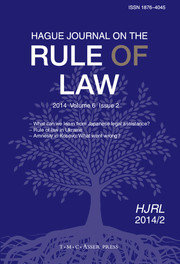Article contents
Empowering Workers in the Informal Economy
Published online by Cambridge University Press: 10 March 2009
Abstract
The Commission on Legal Empowerment of the Poor (CLEP) states that workers in the informal economy can be legally empowered by bringing them within the framework of effective legal regulation, in particular, international labour standards. This paper acknowledges the value of extending rights to workers in the informal economy, but argues that CLEP's recommendations are impractical and unrealistic. It shows that neither international standards nor recent national legislation designed to promote the legalization of informal enterprises offers unqualified positive answers to resolve the plight of workers in the informal economy. Given the poverty of prevailing regulatory structures and the pervasive impact of inadequate structures of governance, workers in the informal economy justifiably distrust legal institutions and, as a consequence, do not, in the first instance, resort to legal institutions in their quest for empowerment. This paper offers examples of strategies that have successfully enhanced the social, political and economic power of workers in the informal economy. It concludes, however, that although the legal system has a role to play in consolidating the gains achieved by these strategies, law and legal institutions do not necessarily offer the best point of departure towards effectively empowering workers in the informal economy.
- Type
- Special Section: Legal Empowerment of the Poor
- Information
- Copyright
- Copyright © T.M.C. Asser Press and the Authors 2009
- 3
- Cited by




